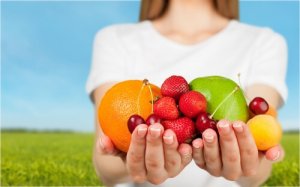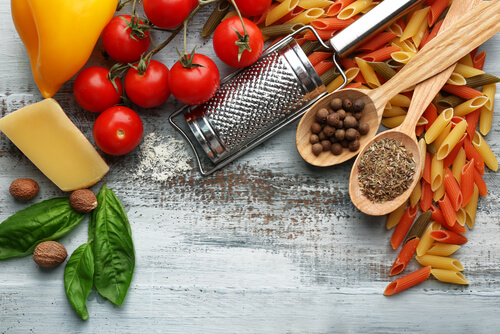Eating is a Necessity, But Eating Well is an Art

A big name in the field of food consciousness, Suzanne Powell, an Irish woman who specializes in nutrition, tells us how to find the best eating style for each person in her book Conscious Nutrition. Suzanne maintains that conscious nutrition means knowing what to eat, how to eat it, and when to eat it.
What should we eat?
“One cannot think well, love well, sleep well, if one has not dined well.”
-Virginia Woolf-
In general, we live a sedentary life in which we don’t exercise consistently, we eat too fast, and we don’t watch our diet. We often don’t know what we’re eating or how our body digests it.
Therefore, it’s essential that you know how the body works, how much oxygen it needs, how to keep a good pH balance, etc.

The human body gets the oxygen it needs through respiration. We can find the oxygen we need in the air we breathe, but because oxygen reserves in the body are virtually nonexistent, we have to introduce more oxygen to the body continuously. Adults breathe between twelve and twenty times per minute, while newborn babies breathe between forty and sixty times per minute.
The relationship between acids and bases in the body is measured with the pH (hydrogen potential) scale, in which 0 is extremely acidic, 14 is extremely basic, and 7 is neutral. Blood should maintain a pH of between 7.40 and 7.45, which is slightly basic.
Which foods are acidic and which foods are basic?
One of the principal factors that influences the acidification of the body is nutrition. Foods that acidify the blood can cause illnesses, and it is advisable to avoid them as much as possible.
Here are some examples of foods that acidify the blood: refined sugar and its derivatives, alcohol, tobacco, anything with dyes and preservatives, etc. Among the foods that help us maintain a slightly basic blood pH are raw fruits and vegetables, nuts and seeds, green plants (aloe vera, seaweed), etc.
How should we eat?
It’s essential to be aware of how we should eat our food. It’s important to not only know the difference between eating them raw and cooked, but also to know how to combine foods correctly.
Suzanne Powell maintains that the way we eat is important both in our daily life and while we are sick, and the correct combination of foods can help us to digest better.
For example, Suzanne states that if we combine proteins with starches, we won’t be able to conveniently digest either of them, because each food group requires a specific environment for proper digestion. Protein dissolves in acid while carbohydrates need a more basic environment.
Our bodies have different enzymes that are produced depending on the food that we’re chewing. When we mix foods that don’t combine well together, like rice and salad with lemon- or vinegar-based dressing, it makes digestion very difficult, and could upset the stomach.

When should we eat?
Different types of foods should not only be combined correctly, but also ingested at the proper time of day.
It’s also important to keep in mind the season you’re in and eat fruits and vegetables that correspond to that season, because even though we have almost all fruits and vegetables at our disposal throughout the whole year, they’re treated with artificial substances.
In the morning, you should eat fruit that’s in season with yogurt and granola for breakfast. For lunch, it’s best to eat salads and carbohydrates, along with seasonal fruit. For dinner, you should combine salad with meat or fish (proteins). If you’re tempted to snack between meals, it’s best to eat nuts, green tea, yogurt, etc.
Knowing what to eat, when to eat it, and how to eat it will help us to digest and metabolize properly. Ultimately, it’s all about being conscious of what you’re eating and how to combine different foods to benefit your health and your body, always under the supervision of a specialist.
“The wise man should consider that health is the greatest of human blessings. Let food be your medicine.”
-Hippocrates-
A big name in the field of food consciousness, Suzanne Powell, an Irish woman who specializes in nutrition, tells us how to find the best eating style for each person in her book Conscious Nutrition. Suzanne maintains that conscious nutrition means knowing what to eat, how to eat it, and when to eat it.
What should we eat?
“One cannot think well, love well, sleep well, if one has not dined well.”
-Virginia Woolf-
In general, we live a sedentary life in which we don’t exercise consistently, we eat too fast, and we don’t watch our diet. We often don’t know what we’re eating or how our body digests it.
Therefore, it’s essential that you know how the body works, how much oxygen it needs, how to keep a good pH balance, etc.

The human body gets the oxygen it needs through respiration. We can find the oxygen we need in the air we breathe, but because oxygen reserves in the body are virtually nonexistent, we have to introduce more oxygen to the body continuously. Adults breathe between twelve and twenty times per minute, while newborn babies breathe between forty and sixty times per minute.
The relationship between acids and bases in the body is measured with the pH (hydrogen potential) scale, in which 0 is extremely acidic, 14 is extremely basic, and 7 is neutral. Blood should maintain a pH of between 7.40 and 7.45, which is slightly basic.
Which foods are acidic and which foods are basic?
One of the principal factors that influences the acidification of the body is nutrition. Foods that acidify the blood can cause illnesses, and it is advisable to avoid them as much as possible.
Here are some examples of foods that acidify the blood: refined sugar and its derivatives, alcohol, tobacco, anything with dyes and preservatives, etc. Among the foods that help us maintain a slightly basic blood pH are raw fruits and vegetables, nuts and seeds, green plants (aloe vera, seaweed), etc.
How should we eat?
It’s essential to be aware of how we should eat our food. It’s important to not only know the difference between eating them raw and cooked, but also to know how to combine foods correctly.
Suzanne Powell maintains that the way we eat is important both in our daily life and while we are sick, and the correct combination of foods can help us to digest better.
For example, Suzanne states that if we combine proteins with starches, we won’t be able to conveniently digest either of them, because each food group requires a specific environment for proper digestion. Protein dissolves in acid while carbohydrates need a more basic environment.
Our bodies have different enzymes that are produced depending on the food that we’re chewing. When we mix foods that don’t combine well together, like rice and salad with lemon- or vinegar-based dressing, it makes digestion very difficult, and could upset the stomach.

When should we eat?
Different types of foods should not only be combined correctly, but also ingested at the proper time of day.
It’s also important to keep in mind the season you’re in and eat fruits and vegetables that correspond to that season, because even though we have almost all fruits and vegetables at our disposal throughout the whole year, they’re treated with artificial substances.
In the morning, you should eat fruit that’s in season with yogurt and granola for breakfast. For lunch, it’s best to eat salads and carbohydrates, along with seasonal fruit. For dinner, you should combine salad with meat or fish (proteins). If you’re tempted to snack between meals, it’s best to eat nuts, green tea, yogurt, etc.
Knowing what to eat, when to eat it, and how to eat it will help us to digest and metabolize properly. Ultimately, it’s all about being conscious of what you’re eating and how to combine different foods to benefit your health and your body, always under the supervision of a specialist.
“The wise man should consider that health is the greatest of human blessings. Let food be your medicine.”
-Hippocrates-
This text is provided for informational purposes only and does not replace consultation with a professional. If in doubt, consult your specialist.







